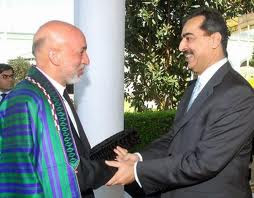 Pakistan and Afghanistan on Saturday agreed on the formation of a joint commission to carry forward the reconciliation process, following the withdrawal of foreign troops from the insurgency-torn country.
Pakistan and Afghanistan on Saturday agreed on the formation of a joint commission to carry forward the reconciliation process, following the withdrawal of foreign troops from the insurgency-torn country.Prime Minister Syed Yusuf Raza Gilani and Afghan President Hamid Karzai, who held exhaustive talks here at the Presidential Palace, described the parleys as “historic”, saying that “the two countries stand together as they have shared destinies.”
Prime Minister Gilani said that he in consultations with President Karzai, Chairman Professor Burhanuddin Rabbani and members of the High Peace Council, had agreed to establish the two-tier Afghanistan-Pakistan Joint Commission for facilitating and promoting reconciliation and peace.
The first tier of commission will include the chief executives, foreign ministers along with chiefs of the military and intelligence services of the two countries while the second tier will comprise senior officials of foreign ministries, military and intelligence services.
“I have assured President Karzai that Pakistan strongly supports an Afghan-led and Afghan-owned process for reconciliation and peace,” Gilani said.
He also extended Pakistan’s full support to the efforts of President Karzai and the High Peace Council, for initiating an inclusive process of grand national reconciliation in which all Afghans not only have a stake but the process also promises the future peace and stability in their country.
“We firmly believe that this process must have full Afghan ownership,” Prime Minister Gilani said and added that it was for the Afghan nation to determine the parameters on which a reconciliation and peace process would be shaped.
“Conditions, qualifications or demands at this stage, in our view, may not be helpful,” he added.
He said that the restoration of stability and peace in Afghanistan was essential for peace, security and well-being of the people of Pakistan.
To a question about President Asif Ali Zardari’s recent statement wherein he warned that a destabilized Afghanistan could have a negative impact on Pakistan, Gilani said he fully endorsed the views. He said his visit was particularly aimed at working out a common strategy to jointly fight terrorism that was a threat to both the nations.
Asked whether the United States (US) was on board regarding the Pak-Afghan talks, Prime Minister Gilani said “the US is on-board. That’s our core group and whatever will be decided, will be among Pakistan, Afghanistan and the US.”
President Karzai, while speaking on the tripartite arrangement, said that his country welcomed consultations with the United States in this regard.
He said Pakistan’s role as a facilitator was also important and added that whatever Prime Minister Gilani said was a “fundamental shift” of Pakistan from its views in the past.
“We today have clarity, which never existed earlier,” Karzai said.
Gilani, when asked about al-Qaeda’s presence in Pakistan, said “it is your country’s problem and you have to decide and set parameters.”
About the role of the United States in Afghanistan, Prime Minister Gilani said “whatever is the policy of the US on Afghanistan, Pakistan will support Afghanistan.”
Gilani also strongly dispelled the notion that terrorists were entering into Afghanistan from Pakistan and said the two countries were already interacting at political, intelligence and defence levels and this cooperation would enhance in the days ahead.
Gilani said that he held in-depth consultations with President Karzai on the situation prevailing in the region and various initiatives that were being talked about for promoting reconciliation and peace.
“I would like to laud the efforts of our Afghan brothers and sisters across length and breadth of Afghanistan to realize their legitimate aspirations for peace and stability.”
President Karzai described the message from Prime Minister Gilani on the reconciliation process as very “clear” and “important” and added that the two sides held detailed talks on all aspects, including the situation in the region and bilateral political, economic and trade relations.
Prime Minister Gilani termed the drone attacks “counter-productive” and added that loss of precious human lives could not be just dismissed as “collateral damage.”
Gilani said similarly, suicide attacks, resulting in loss of innocent lives as well as attacks on places of worship were not only inhuman and barbaric but evidently designed to denigrate Islam and to sow discord among Muslims, communities and societies.
Prime Minister Gilani said his visit to Afghanistan was aimed at reaching out to the Afghani people. He said in his opening remarks that he was here to convey respect and admiration for the great Afghan nation and to renew “deep-rooted bonds of fraternal solidarity.”
 RSS Feed
RSS Feed Twitter
Twitter









No comments:
Post a Comment